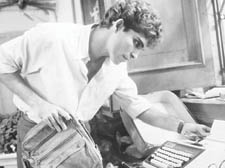|
|
 |
| |

David played by Vladimir Cruz in Strawberry and Chocolate |
Sweet story of Cuban fight for artistic freedom
STRAWBERRY AND CHOCOLATE
Directed by Tomas Gutierrez Alea
Certificate 18
THIS thoughtful film serves up interesting questions about the nature of personal liberty in Cuba.
Tomas Alea is recognised as one of Cuba’s greatest film directors, and he has an ambiguous relationship with the government.
His films can be subversive in the eyes of the ruling Communists, but are not censored and are even championed as marks of how the Cuban government allows artistic endeavour to flourish.
In Strawberry and Chocolate, the two main protagonists fight a battle of wits – one the student revolutionary sold on the idea of progressive politics, the other, a gay artist who is stopped from exhibiting his bizarre collection of Christ icons (with hammers and sickles stuck into them) and also faces awful homophobia.
It is 1979, and Cuban life is deeply intertwined with political understanding. Even a small gesture such as drinking Johnnie Walker whiskey is charged – “It is the drink of the enemy,” we are told.
We meet Diego (Jorge Perrugoria), a gay art lover. He attempts to chat up ideologically driven student David (Vladimor Cruz) and the pair start an unlikely relationship: Diego wanting to discuss love, relationships, art, food, music and culture, while David is not quite sure at first what his motivation for visiting Diego at his flat is – except he is aware that the flat’s walls are packed full with works that have been condemned as Western and bourgeois.
He discusses his experience with fellow student Miguel (Francisco Gatorno), who believes Diego’s sexuality is in some way anti-revolutionary. Miguel tells David to keep an eye on his new friend’s actions. Despite these pressures, the friendship develops and what arises is a fascinating consideration of the individual versus the state.
Havana, in all its faded glory, is beautiful: balustrades and balconies, inlaid doors and ornate windows, rusted iron work all provide a lovely background for the action.
The distributors for this rare piece of Cuban cinema are Contemporary Films, a Gospel Oak-based outfit set up in 1951 by Charles and Kitty Cooper. Charles was a Communist who wanted to offer British film lovers an alternative to the American-dominated industry.
“They were bringing in foreign language films people had not seen before,” explains company director Eric Litnaitzky.
“Charles’s politics meant he was very keen to show films that were not part of the Hollywood system.
“He wanted cinema that made a social and political points.
“He wanted to bring foreign language and eastern European films into British cinema-goers.”
And with this latest release, Eric is still fulfilling the brief Charles and Kitty laid out in the early 1950s. |
 |
|
 |
| |
|
 |
|

